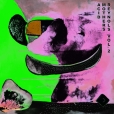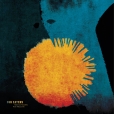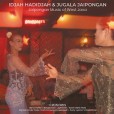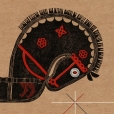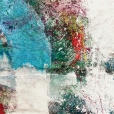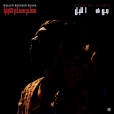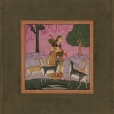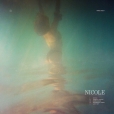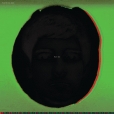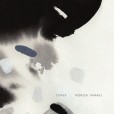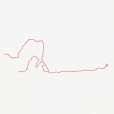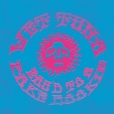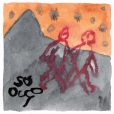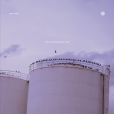Your basket is empty

Yara Asmar
everyone i love is sleeping and i love them so much
Hive Mind
‘Eleven pieces recorded over the past year, moving between the small town of Alfred in upstate New York, and Beirut; stepping out, as if onto ice, into a new life on a new continent during a time of tragedy, turmoil, and upheaval.
‘Unfamiliar instruments, new materials and new sounds delicately build on Yara’s intimate style, with its backbone of homemade mechanical music boxes and personal archive of family recordings. She explores the peculiar resonance of the metallophone, and delves into her collection of deconstructed toy pianos, guiding her music into ever more surreal territories… dreamlike, fragile, fragmentary, and strangely timeless.’
Contemporary psych legends Acid Mothers Temple and Reynolds collaborating in the studio in 2017. Improvisatory, shamanic, ecstatic, nuts.
‘This improvised, telepathic collaboration between underground legend Rob Mazurek and modular-synth maestro Alberto Novello is a dizzying, psychedelic space ritual. A delicate weft of harmony and melody on trumpet — plus atmospheric bells and samples — rides a loose rhythmic, timbral magic carpet, way out into uncharted dimensions of sound.’
Brothers Evgeny and Mikhail Gavrilov from Novosibirsk in Siberia.
You might remember Mikhail’s excellent cassette, Roots, which came out on Hive Mind in 2022, under the name Misha Sultan.
‘A little bit like a collaboration between Metalheadz and Weather Report, to accompany a seventies cop thriller.’
‘Mind-melting West Javanese gong pop, recorded in 2007 at Jugala studios in Bandung, based on a Javanese secular village music and dance tradition known as ketuk-tila, which was transformed into a popular studio music in the early 1960s by the producer Gugum Gumbira, founder of Jugala. With vocals by Idjah Hadidjah, one of the key historic voices of jaipongan, the situation here is disorientatingly heavy, low bpm gong pressure coming straight from the originators. It is a much less dainty affair than classical Javanese gamelan, and less febrile than the fully automatic Balinese variant. Hadidjah’s golden voice sews together shifting polyrhythms that would baffle a watchmaker; the whole is embroidered by rehab and underpinned by Mariana Trench level bass drops. A second disc features a set of thoughtful electronic reworkings’ (Frances Gooding, The Wire).
“In the beginning of the pandemic we decided to take a turn and move to a small beach close to São Paulo, right in the middle of the rain forest… water definitely took a major role in our lives. We were living right in between the ocean and a waterfall, it´d rain for days on a roll sometimes and it was an open house where we had the sound of rain 360 degrees around us… I kinda think our music has a little of those different dynamics of water in its different states. Also, it might seem strange but São Paulo is a city in the water too, and it has a very chaotic relationship with it.”
‘The music itself is difficult to pin down: always kinetic and driven by fluid, nimble percussion, with a freeness to the sound overall, but also discipline, as the pair harness and channel the elemental force from which they’ve drawn their inspiration. At times the lines between Takara’s skittish percussion and Boregas’ idiosyncratic synth work and sound manipulation blur into flowing rivers or torrents of sound — here, both water and sound have the ability to awaken in us different memories, and emotional or physical states.
‘We could say say their sound contains clear influences from jazz, classic dub, krautrock, and the outer limits of post-punk. Contemporary allies include Holy Tongue, Shackleton, Oren Ambarchi…’
‘Son of Maalem Mahmoud Guinia, Maalem Houssam Guinia is one of Morocco’s most exciting young Gnawa masters.
‘Dead of Night was recorded live on the night of 3rd January 2022, in a relaxed session in a Casablanca residence. It captures Houssam at his most natural, singing and playing the Gnawa songs that have been with him since his birth, completely solo and free without percussion or backing vocals. Houssam says these are the songs he knows best; the music his father would play and sing late into the night in their home when he was an infant.
‘Raw, deep, spiritual Gnawa in its purest form.’
A Bengali-Italian collaboration — nurtured by Rimini’s Associazione Ardea, for refugees — psychedelically combining ancient folk and cosmic synth exotica.
Entrancing, fresh renditions of mystical Baul songs, with Md After accompanying himself on
harmonium and two headed pakhawaj drum, over Andrea Rusconi’s warm Crumar synth and veena string drones.
Check it out.
Bringing together two EPs of hushed, late-night atmospherics.
Intense, dreamlike songs influenced by folk and minimalism, and informed by feminism, ecology and posthuman communication, deploying magnetic tapes, field recordings, and bits from the speech of contemporary thinkers, besides harmonium, organ, violin and cello, toy and electric guitar, and a small choir.
‘This third solo album is a deep, widescreen exploration in classic Brazilian song with all the subtlety and delicacy you’d expect from the pioneers of Musica Popular Brasileira, coupled with a thoroughly 21st century sensibility and sonic innovativeness. Layers of intricate instrumentation and arrangement make for spellbound, excavatory listening.
‘Recorded following Gomes’ move from Rio to Lisbon, the album is imbued with a sense of unease and cultural dislocation. A number of songs based on the Samba Ostinato explicitly celebrate Brazil’s musical heritage and culture.
‘Led by Gomes’ gentle and dreamy voice, the music is often reminiscent of mighty trailblazers like Caetano Veloso, João Bosco, or Edu Lobo, though it takes unexpected lines of flight into more experimental territory. An element of drone underpinning the whole album takes full charge on Fllux and Transição; and the finale is molten, raging hardcore.
‘A sun-drenched, balmy dream from start to finish.’
The guitarist’s debut album, inspired by a road trip through Brazil, taking in a Sun City Girls show in a remote former gay club, and a visit to a spiritual healer. He leads upright bass, drums, vibraphone, saxophone and percussion.
‘I decided that I would try to forge, in my own way, from my references, from my universe and from the collective intelligence and sensibility that surrounded me, fundamental melodies, repetitive, minimal, hypnotic rhythmic and harmonic patterns that would be crossed by some sort of improvisation, something that referred to a reality that existed before my individual history, that linked to the life of other places and other times.’
‘unique and beguiling…evocative and profound… music of rare depth’ (The Wire).
‘taps into the common ground between meditative, ambient and trance musics… delightful’
(Chris May, All About Jazz).
Trá Pháidín are a nine-piece from Conamara, Galway, a wild coastal region of West Ireland, where Gaeilge remains the first language. They make a joyful noise — a unique and unpredictable blend of traditional Irish folk, post-rock, jazz, and Dadaist absurdity.
Their album An 424 is a freewheeling, dialectical consideration of the 424 bus route and its passengers, passing up and down the coastline from the Gaeltacht into anglophone Ireland, and vice versa, and taking in wondrous locations like Cuan na Gaillimhe / Galway Bay, An Bhoirinn / the Burren, na hOileáin Árann / the Arann Islands, Aillte an Mhothair / the Cliffs of Moher, Portach Mhaigh Cuilinn / the bogs of Maigh Cuilinn, Bóthar Loch an Iolra / Eagle lake road, Cuan Casla / Casla Harbour, Cuan an Fhir Mhóir / Greatman’s Bay, Cnoc Mordáin / Mordáin hill, Sléibhte Mhám Toirc / the Maamturk Mountains, Na Beanna Beola / the twelve pins…
‘This is a topic you could write a PhD about (and maybe someone already has),’ says the band. ‘But if you are someone who grew up or lives in this region, you have a particular understanding at this stage of how complicated Gaelic psyche is and the kind of spectrum of identity along bóthar Choise Fharraige. With the landscape in mind, this bus journey is a great meditation on the various topics of life.’
Listen out for flights of wild improvisation filled with brass, woodwinds, harp, and fiddles… and hard-nosed grooves.
Deep-fried rural psychedelia, primitive drum-machine grooves and woozy country-funk — including unlikely covers of The Blackbyrds, Michael Hurley and Jimmy Cliff — by Matt Valentine (MV) and Pat Gubler (PG Six), locked down in Vermont with pals S. Freyer Esq, Jim Bliss, Coot Moon and Carson ‘Smokehound’ Arnold.
Summery, joyous, experimental pop; full of musical surprises and emotional twists and turns. The lush brass and woodwind arrangements are guided by Antonio Neves. Classic songwriting and cutting edge production, lit up by the beauty and chaos of Rio, and its sounds and rhythms; inspired by the pioneers of Música Popular Brasileira.
Fragile, deep, melancholic, enthralling home recordings from Beirut; lost in memories, worry, grief, rapture, love.
Very warmly recommended.
‘Highest recommendation’, Foxy Digitalis; ‘evanescent bliss, an invitation to a safe space both isolated and welcoming’, The Quietus; ‘a sweep of introspective, breath-catching moments of beauty’, Pitchfork. ‘The combination and contrast of highly familiar and highly alien elements give Asmar’s music a quality not quite like anything else I can name. The way she channels found voices into her surreal mix of sounds is particularly striking’
(Byron Coley, The Wire).
Her first two cassette releases remastered and presented in a gatefold sleeve featuring new art-work by Yara herself.

